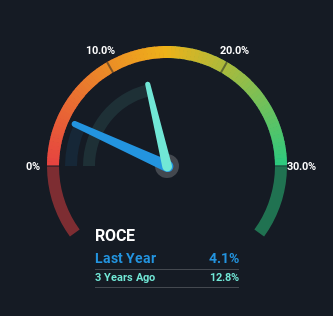- United States
- /
- Transportation
- /
- NYSE:SNDR
Schneider National's (NYSE:SNDR) Returns On Capital Not Reflecting Well On The Business
If we want to find a potential multi-bagger, often there are underlying trends that can provide clues. Ideally, a business will show two trends; firstly a growing return on capital employed (ROCE) and secondly, an increasing amount of capital employed. Basically this means that a company has profitable initiatives that it can continue to reinvest in, which is a trait of a compounding machine. However, after briefly looking over the numbers, we don't think Schneider National (NYSE:SNDR) has the makings of a multi-bagger going forward, but let's have a look at why that may be.
Return On Capital Employed (ROCE): What Is It?
For those that aren't sure what ROCE is, it measures the amount of pre-tax profits a company can generate from the capital employed in its business. The formula for this calculation on Schneider National is:
Return on Capital Employed = Earnings Before Interest and Tax (EBIT) ÷ (Total Assets - Current Liabilities)
0.041 = US$159m ÷ (US$4.5b - US$659m) (Based on the trailing twelve months to June 2024).
Therefore, Schneider National has an ROCE of 4.1%. Ultimately, that's a low return and it under-performs the Transportation industry average of 7.7%.
View our latest analysis for Schneider National

Above you can see how the current ROCE for Schneider National compares to its prior returns on capital, but there's only so much you can tell from the past. If you'd like, you can check out the forecasts from the analysts covering Schneider National for free.
How Are Returns Trending?
When we looked at the ROCE trend at Schneider National, we didn't gain much confidence. To be more specific, ROCE has fallen from 11% over the last five years. Given the business is employing more capital while revenue has slipped, this is a bit concerning. If this were to continue, you might be looking at a company that is trying to reinvest for growth but is actually losing market share since sales haven't increased.
The Bottom Line
From the above analysis, we find it rather worrisome that returns on capital and sales for Schneider National have fallen, meanwhile the business is employing more capital than it was five years ago. Yet despite these concerning fundamentals, the stock has performed strongly with a 51% return over the last five years, so investors appear very optimistic. In any case, the current underlying trends don't bode well for long term performance so unless they reverse, we'd start looking elsewhere.
One more thing, we've spotted 1 warning sign facing Schneider National that you might find interesting.
If you want to search for solid companies with great earnings, check out this free list of companies with good balance sheets and impressive returns on equity.
New: Manage All Your Stock Portfolios in One Place
We've created the ultimate portfolio companion for stock investors, and it's free.
• Connect an unlimited number of Portfolios and see your total in one currency
• Be alerted to new Warning Signs or Risks via email or mobile
• Track the Fair Value of your stocks
Have feedback on this article? Concerned about the content? Get in touch with us directly. Alternatively, email editorial-team (at) simplywallst.com.
This article by Simply Wall St is general in nature. We provide commentary based on historical data and analyst forecasts only using an unbiased methodology and our articles are not intended to be financial advice. It does not constitute a recommendation to buy or sell any stock, and does not take account of your objectives, or your financial situation. We aim to bring you long-term focused analysis driven by fundamental data. Note that our analysis may not factor in the latest price-sensitive company announcements or qualitative material. Simply Wall St has no position in any stocks mentioned.
About NYSE:SNDR
Schneider National
Provides multimodal surface transportation and logistics solutions in the United States, Canada, and Mexico.
Proven track record with adequate balance sheet.
Similar Companies
Market Insights
Community Narratives





